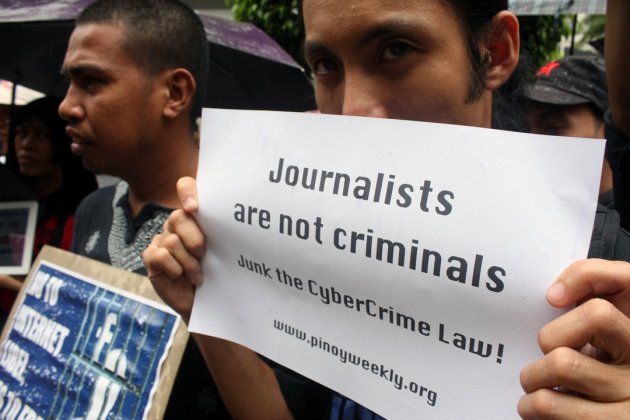
Hackers and not the government are the ones depriving Filipinos of Internet access, the Palace said, amid mounting protests against the Cybercrime Prevention Act which takes effect Wednesday.
“[H]ackers who claim to be aligned with critics of the Cybercrime Act are the ones who have engaged in online vandalism, depriving the broader public of access to much needed government information and services online,” Presidential Spokesperson Edwin Lacierda said in a statement.
Several government websites have been crippled in the days leading to the law’s Oct. 3 rollout, with netizens floating the possibility that even the government’s main portal gov.ph as well as websites of the Senate and House of Representatives have been compromised.
The Cybercrime Law’s critics should condemn “online vandalism and bullying with as much vigor and passion,” Lacierda said.
“[V]igilantism harms the cause of freedom of expression and civil liberties for all netizens,” he added.
This, as Lacierda assured the public that the new law will not rob Filipinos of online rights.
“[N]o government entity has moved to deprive anyone of access to the Internet or to suppress civil liberties as exercised online,” Lacierda noted.
“The Cybercrime Prevention Act was enacted by Congress to address legitimate concerns about criminal behavior on the Internet and the effects of abusive behavior,” he added.
Lacierda also noted that the government “recognizes and respects” proposed amendments to the law as well as efforts at raising questions about the constitutionality of some of its provisions.
At least seven petitions against the new law have been filed before the Supreme Court, which said Tuesday that it will not move to block the Cybercrime Act’s implementation.
Senator Francis Escudero meanwhile said he will file a bill seeking to repeal the law’s libel provisions, which has drawn most flak from freedom of expression advocates.
“In the meantime we believe there is an opportunity for reasonable discourse between concerned stakeholders and the Department of Justice,” Lacierda said.
He also urged “fullest and widest participation” of stakeholders in drafting the implementing rules and regulations (IRR) of the Cybercrime Prevention Act.

0 comments:
Post a Comment